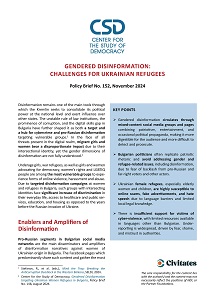CSD Policy Brief №. 152: Gendered Disinformation: Challenges for Ukrainian Refugees
CSD Policy Brief №. 152: Gendered Disinformation: Challenges for Ukrainian Refugees
Author(s): Author Not Specified
Subject(s): Gender Studies, Studies in violence and power, Fake News - Disinformation, Hybrid Warfare
Published by: Център за изследване на демокрацията
Keywords: dis-information; hybrid war;
Summary/Abstract: Disinformation remains one of the Kremlin's main tools for consolidating political power at the national level and exerting influence over other states. Bulgaria's unstable rule of law institutions, high levels of corruption and digital skills gap have further made it both a target and a hub for cybercrime and pro-Russian disinformation targeting vulnerable groups. Of all the threats in the digital sphere, migrant girls and women, female war refugees, and girls and women working for democracy, women's rights and LGBTIQ people are among the most vulnerable to forms of online violence, harassment and abuse. Due to disinformation campaigns targeting women and refugees in Bulgaria, such groups with intersecting identities face a significant increase in discrimination in their daily lives, access to healthcare and public services, education and housing, compared to the years before the Russian invasion of Ukraine. // Pro-Russian segments in Bulgarian social media networks are the main disseminators and amplifiers of disinformation narratives against women of Ukrainian origin in Bulgaria. The Facebook pages that predominantly share such content and attract the most interactions include support for Putin, Russia and anti-Euro-Atlantic positions in their titles. They promote pro-Russian views such as leaving NATO, opposing Bulgaria's accession to the eurozone, and the Kremlin's supremacy in geopolitics and as the sole defender of 'traditional values'. // Some Bulgarian politicians and civil society activists repeat pro-Russian rhetoric, but such discriminatory, reductive and harmful behaviour is not limited to the far-right or fringe parties in Bulgaria. In addition, Bulgarian politicians largely avoid being associated with issues related to gender identities for fear of being branded as promoters of gender ideology , a culturally pejorative term in Bulgarian slang implying the propagation of non-traditional sexual identities and sexualised content. As a result, gender disinformation remains off the political agenda. There is no political will to introduce legislation and policy measures to combat identity-based disinformation, online abuse and hate crimes because policymakers themselves do not perceive it as disinformation and neglect the real consequences of the problem.
Series: Center for the Study of Democracy - CSD Policy Briefs
- Page Count: 8
- Publication Year: 2024
- Language: English
- Content File-PDF

